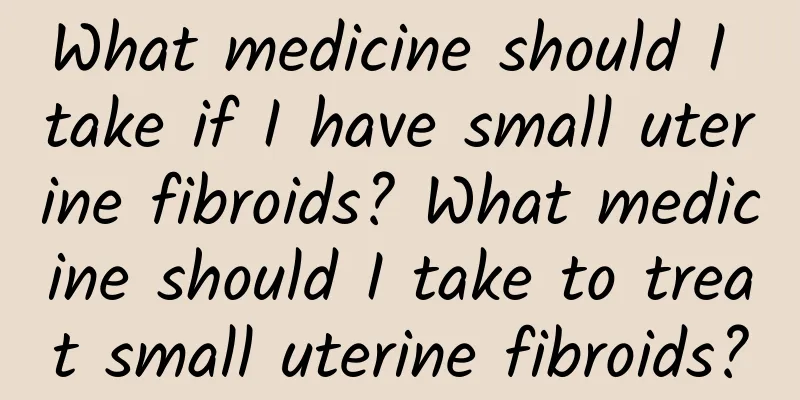What medicine should I take if I have small uterine fibroids? What medicine should I take to treat small uterine fibroids?

|
What medicine should I take if I have small uterine fibroids? This is a question that many women are concerned about. There is no doubt that small uterine fibroids are a common benign tumor, but they may still cause discomfort and inappropriate symptoms. Therefore, it is very important to treat small fibroids. So, what medicine should we use to treat small uterine fibroids? First of all, we need to clarify the cause and development mechanism of small fibroids. Uterine fibroids are benign tumors composed of smooth muscle cells that grow on the wall of the uterus. Although small fibroids generally do not cause serious complications, for some patients, they may cause problems such as irregular menstruation, abdominal pain, and infertility. Therefore, treatment is usually necessary to relieve these symptoms and prevent further growth of small fibroids. Treatment options for fibroids vary and are individualized based on the size and location of the fibroid and the patient’s symptoms. Below are some common medical treatments that can help patients relieve symptoms and control the growth of small fibroids. 1. Hormonal drugs: Hormonal drugs, such as estrogen and progesterone, can adjust hormone balance and reduce the growth of fibroids. Estrogen receptor antagonists, such as doxycycline and progesterone, are widely used to treat postpartum uterine bleeding and uterine fibroids. 2. Progesterone drugs: Progesterone is an important progestogen that regulates the endometrium and uterine smooth muscle. Progesterone can inhibit the proliferation of the endometrium and slow down the growth of small fibroids. 3. Traditional Chinese medicine treatment: Traditional Chinese medicine treatment is widely used in China and many other countries and regions. Some traditional Chinese medicine preparations, such as Xiaoyao Pills and Liuwei Dihuang Pills, are said to regulate hormone balance and slow the growth of small fibroids. However, because each person's constitution and type of fibroids are different, caution must be exercised when using traditional Chinese medicine treatment, and it is best to consult a traditional Chinese medicine practitioner for advice. Although medications can help slow the growth of small fibroids and relieve symptoms, these medications are not a complete cure for fibroids. If symptoms are severe or the fibroids are growing rapidly, surgery may be a more appropriate option. Finally, it is also important to note that in addition to medication and surgical treatment, lifestyle and dietary changes can also have a positive impact on the treatment of small fibroids. Maintaining a proper weight, regular exercise, and a balanced diet can help maintain hormone balance and slow the growth of fibroids. What medicine should I take for small uterine fibroids? For those patients who have symptoms, drug treatment can be an effective option. However, different patients and fibroid types require individualized treatment methods. It is crucial to consult a doctor and choose the appropriate treatment based on personal circumstances. Changing lifestyle and dietary habits should also be combined with drug treatment to minimize the growth of fibroids and the occurrence of symptoms. |
Recommend
Say goodbye to obesity! 3 Dietary Methods to Reduce Edema after Childbirth
In medicine, there is a formal term for the "...
How to treat uterine fibroids How to use medication for uterine fibroids
It is very harmful for women to suffer from uteri...
Experts explain the health care of candidal vaginitis
Correct health care for candidal vaginitis is ver...
Shengdi Bamboo Leaf Porridge can assist in the treatment of severe cervical erosion
Patients with severe cervical erosion often exper...
Why does cervical erosion last for a long time?
Due to certain factors, the vaginal environment c...
Key points for diagnosis of incomplete abortion
Incomplete abortion often occurs in late pregnanc...
What are the topical medications for vulvar itching?
Female friends often ask experts, what are the to...
What happens if my menstrual flow is heavy after curettage?
What happens if my menstrual flow is heavy after ...
What are the causes of ectopic pregnancy?
What are the causes of ectopic pregnancy? Ectopic...
The harm of ovarian cysts that female friends need to pay attention to
In real life, the harm of ovarian cysts needs to ...
How to completely cure threatened abortion
Many women are worried about threatened abortion ...
What is the pain of pelvic inflammatory disease?
Pelvic inflammatory disease is a gynecological di...
I had sex 2 days after the miscarriage.
Having sex 2 days after a miscarriage is not reco...
What is the cure rate of hyperprolactinemia?
What is the cure rate of hyperprolactinemia? In f...
Does sexual life necessarily cause cervical erosion? What are the causes of cervical erosion?
Cervical erosion is a common cervical disease amo...









